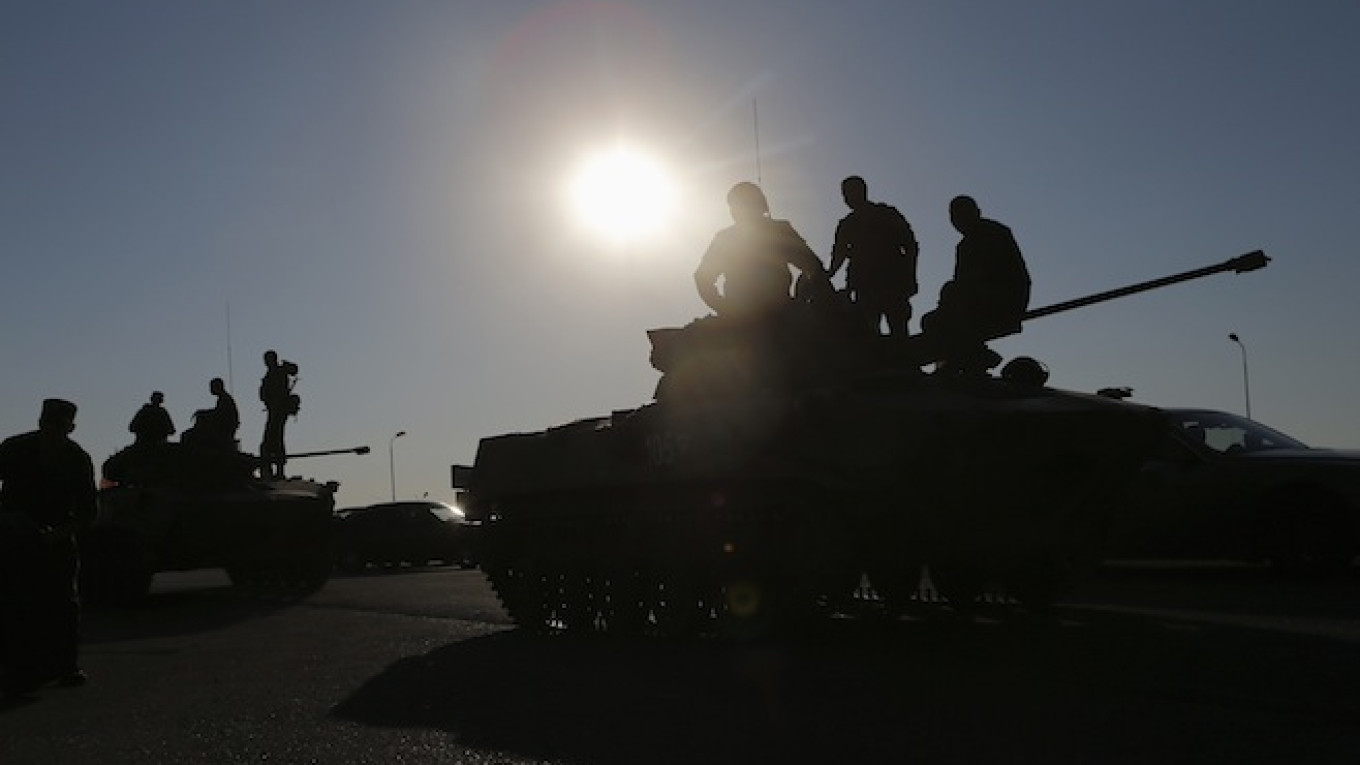BRUSSELS — European Union foreign ministers voiced concern Friday at reports that Russian military vehicles had crossed into Ukraine overnight, but behind the tough talk there were signs that EU unity over sanctions against Moscow was fraying.
British Foreign Secretary Philip Hammond said he was alarmed by reports in British papers that at least 23 Russian military vehicles had crossed the border, and warned Moscow of serious consequences if it did not withdraw any forces it had there.
NATO Secretary General Anders Fogh Rasmussen later said there had been a "Russian incursion" into Ukraine, but stopped short of characterizing it as an invasion.
Ministers from two of the more hawkish EU countries, Sweden and Latvia, said the EU could impose more sanctions if the Ukraine situation deteriorated or Russia used an aid convoy as a pretext for invasion.
But behind the rhetoric there were signs that a ban on most food imports from the West, announced by Russia last week, was undermining EU resolve to confront its biggest energy supplier.
Many EU capitals fear that a deepening trade war with Russia could snuff out hopes of recovery. Data released Thursday showed that economic growth in the 18-nation euro zone had already slowed to zero in the second quarter of the year, even before the impact of Russia's reprisals was felt.
Hungarian Prime Minister Viktor Orban said Friday that the EU had harmed itself economically with the sanctions on Russia and called for a rethink.
Orban's remarks came a day after his Slovak counterpart, Robert Fico, criticized the sanctions as "meaningless," saying they would threaten economic growth in the 28-member EU.
Both countries have strong economic and energy ties with Russia and have been critical of EU sanctions in the past.
In The Foot
"The sanctions policy pursued by the West … causes more harm to us than to Russia," Orban said in a radio interview. "In politics, this is called shooting oneself in the foot."
Lithuanian Foreign Minister Linas Linkevicius, arriving for the EU foreign ministers meeting in Brussels, retorted that it was better to shoot yourself in the foot than to let yourself be shot in the head — a reference to fears in the former Soviet republic over Russian assertiveness.
Swedish Foreign Minister Carl Bildt denied Russia's ban on food imports had opened divisions within the EU. He said the Russian reprisals would have a marginal impact on the EU but would hurt Russia's emerging middle class.
The EU has always been divided into different camps over sanctions — with countries such as Britain, France, Poland, Sweden and the Baltics in the hawkish camp while countries such as Greece, Bulgaria and Austria are more reluctant.
There were signs the EU was holding out an olive branch to Russian President Vladimir Putin.
The European Commission announced late Thursday that Putin, Ukrainian President Petro Poroshenko and commission president Jose Manuel Barroso had agreed to talks to try to resolve Russian-Ukrainian disputes over gas pricing and trade.
Finnish President Sauli Niinisto told Putin on Friday that both sides' sanctions were damaging bilateral ties, and proposed to seek ways to end the Ukraine crisis.
After several rounds of mild sanctions on Russia over its annexation of Ukraine's Crimea region and role in eastern Ukraine, the shooting down of a Malaysian airliner over Ukraine in July galvanized the EU to impose broad economic measures affecting Russian access to European financial markets and technologies used by the defense and oil sectors.
Russia's ban on EU food has led to fears of a glut of some produce in Europe, leading the European Commission this week to promise financial support for EU fruit and vegetable growers.
EU ministers did not discuss imposing any further sanctions on Russia on Friday. Instead they focused on the impact of sanctions on the EU's own economy.
The EU is also set to start a diplomatic campaign to try to convince countries such as Brazil and Egypt that might be tempted to fill the gap left by EU food producers in Russia to "avoid playing … an unfriendly game towards the European Union," a senior EU official said.
See also:
British Journalists Report Russian Military Crossed Ukraine Border
A Message from The Moscow Times:
Dear readers,
We are facing unprecedented challenges. Russia's Prosecutor General's Office has designated The Moscow Times as an "undesirable" organization, criminalizing our work and putting our staff at risk of prosecution. This follows our earlier unjust labeling as a "foreign agent."
These actions are direct attempts to silence independent journalism in Russia. The authorities claim our work "discredits the decisions of the Russian leadership." We see things differently: we strive to provide accurate, unbiased reporting on Russia.
We, the journalists of The Moscow Times, refuse to be silenced. But to continue our work, we need your help.
Your support, no matter how small, makes a world of difference. If you can, please support us monthly starting from just $2. It's quick to set up, and every contribution makes a significant impact.
By supporting The Moscow Times, you're defending open, independent journalism in the face of repression. Thank you for standing with us.
Remind me later.


